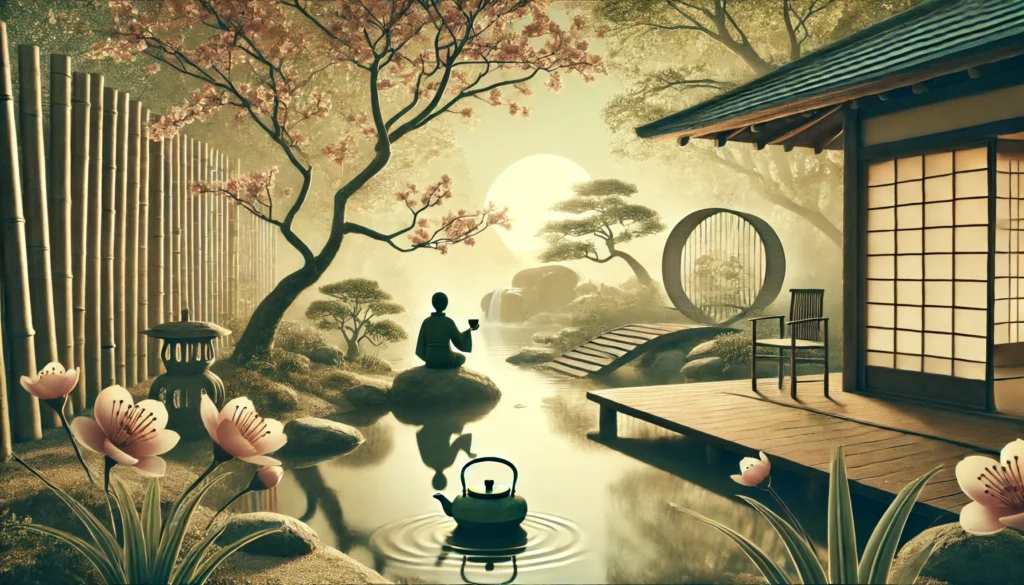Table of Contents
Introduction to Ikigai
Ikigai, a Japanese term that translates to “reason for being,” encompasses a profound philosophy intricately linked to the pursuit of purpose and fulfillment in life. This concept plays a pivotal role in Japanese culture, where it serves as a guiding principle for individuals seeking to achieve a harmonious balance between their passions, talents, and societal contributions. The essence of ikigai can be distilled into four fundamental elements: what you love, what you are good at, what the world needs, and what you can be paid for. When these elements intersect, one can discover their unique ikigai, offering a pathway to both personal satisfaction and communal well-being.
The cultural significance of ikigai is deeply rooted in the Japanese way of life, where community ties and individual purpose are celebrated as essential components of happiness and longevity. This philosophy is not merely a modern trend but is ingrained in the psyche of Japanese society, often observed in the daily routines of elder generations who embody the principles of ikigai through meaningful work, social interactions, and lifelong learning. These individuals often exhibit remarkable health and vitality, which researchers attribute to their unwavering commitment to their ikigai.
As we delve deeper into the exploration of ikigai, it becomes evident that understanding this concept not only enriches personal lives but also fosters a sense of interconnectedness within communities. The pursuit of ikigai encourages reflection on one’s passions and values, ultimately leading to a life imbued with purpose. In a world where the search for meaning is becoming increasingly prevalent, ikigai presents a timeless framework that offers insights into achieving both longevity and happiness. By embracing this philosophy, individuals can cultivate a life filled with joy and contribute positively to their surroundings.

The Four Pillars of Ikigai
Ikigai, a term deeply rooted in Japanese culture, represents the harmonious intersection of four fundamental components that collectively contribute to a fulfilling life. These pillars are essential in guiding individuals towards discovering their purpose, thereby nurturing contentment and longevity.
The first pillar encompasses what you love. This aspect is about identifying passions and interests that ignite joy and enthusiasm in daily life. Engaging in activities that bring happiness not only enriches personal well-being but also fosters a lucid understanding of one’s desires and aspirations. Passion is an intrinsic motivator that propels individuals toward their ikigai.
The second pillar involves what you are good at. Recognizing one’s skills and talents is crucial for achieving balance in life. This pillar encourages individuals to reflect on their strengths and competencies, seeking opportunities to develop them further. By leveraging these abilities, people can cultivate a sense of achievement and confidence, reinforcing their journey toward meaningful pursuits.
The third facet pertains to what the world needs. It emphasizes the significance of contributing to society and addressing the needs of others. This pillar prompts individuals to consider how their passions and skills can serve a greater purpose, fostering a sense of fulfillment that transcends personal achievement. Engaging with community and understanding societal needs can guide individuals toward aligning their efforts with the greater good.
Finally, the fourth pillar relates to what you can be paid for. This aspect concerns the practicalities of life, where financial sustainability is necessary. Striking a balance between personal passions and marketable skills is crucial for long-term fulfillment. By exploring avenues that allow for monetary compensation while remaining aligned with the first three pillars, individuals can achieve a holistic sense of purpose.
In conclusion, the four pillars of ikigai—what you love, what you are good at, what the world needs, and what you can be paid for—serve as essential guides in the quest for a fulfilling life. By finding harmony among these components, individuals can navigate their paths toward lasting happiness and well-being.
The Health Benefits of Ikigai
Ikigai, a Japanese concept that translates to “a reason for being,” plays a significant role in promoting mental and physical well-being. A strong sense of purpose, encapsulated in the notion of ikigai, has been linked to varied health benefits that contribute to a long and fulfilling life. Numerous studies emphasize how identifying one’s ikigai can effectively enhance mental health by fostering resilience against depression and anxiety. When individuals resonate with their purpose, they often experience heightened motivation, better emotional regulation, and improved overall life satisfaction.
Research suggests that individuals who have a clear sense of ikigai tend to report lower levels of stress. This reduction in stress is particularly notable as chronic stress can lead to a myriad of health issues, including cardiovascular diseases and metabolic disorders. An engaged life driven by ikigai encourages healthy habits, such as socializing, engaging in hobbies, and pursuing physical activities, which in turn contribute to lower cortisol levels and enhanced psychological well-being.
Moreover, a persistently positive outlook associated with ikigai aligns with increased longevity. Studies from Japan indicate that regions with populations who have cultivated a strong sense of purpose witness lower mortality rates and better health outcomes. For instance, the residents of Okinawa, famously known for their longevity, often attribute their extended lifespans to cultivating and pursuing their ikigai. These individuals engage in community activities, maintain active lifestyles, and nurture relationships, resulting in both emotional and physical benefits.
In essence, the health benefits associated with experiencing ikigai are multifaceted, impacting mental resilience, stress reduction, and even lifespan. Embracing the journey to discover one’s ikigai can profoundly influence not only personal health but also the community at large. This exploration of purpose instills a sense of belonging, fueling a holistic approach toward living a longer, happier life.
Cultural Perspectives on Ikigai
Ikigai, a multifaceted concept originating from Japan, serves as a cornerstone of Japanese culture, closely woven into the social and personal lives of its citizens. This term translates to “a reason for being” and reflects the profound connection between purpose and happiness. Across various dimensions of life, Ikigai plays a crucial role in shaping the attitudes and behaviors of individuals, ultimately influencing the collective well-being of society. One prominent manifestation of Ikigai is found in the Japanese approach to work. In this context, work is not simply a means to achieve financial gain; it is often regarded as a path to fulfillment and self-expression. Many Japanese workers emphasize the importance of finding joy in their occupations, viewing their professional endeavors as an extension of their identities. This aligns closely with the concept of the “salaryman,” where individuals dedicate themselves to their companies, deriving satisfaction from loyalty and contribution.
Moreover, the notion of Ikigai extends into social relationships, where community ties and familial bonds are highly valued. The Japanese often prioritize collective well-being over individual desires, seeing their roles within the family and society as integral to their sense of purpose. Social gatherings, festivals, and shared experiences serve to reinforce these connections, allowing individuals to derive joy from communal activities. Daily routines also embody the principles of Ikigai; for instance, practices such as Zen meditation and traditional tea ceremonies foster mindfulness and reflection, allowing individuals to embrace the beauty of the present moment. These rituals encourage a deep connection to nature and self, further solidifying the idea that happiness is intertwined with one’s environment and relationships.
In essence, Ikigai in Japanese culture is a profound reminder of the importance of living a purposeful life, deeply embedded in work, community, and daily practices.
How to Discover Your Own Ikigai
Identifying your own Ikigai involves a thoughtful process of self-reflection and exploration, aligning your passions with your skills, values, and the needs of the world around you. To begin, consider dedicating some time to these four essential pillars: what you love, what you are good at, what the world needs, and what you can be rewarded for. Here are some actionable steps and exercises to help you uncover your unique purpose.
Start with self-reflection questions to clarify your values and desires. Ask yourself: What activities engage and excite me? What skills do I possess that I feel confident in? Additionally, consider the needs of your community. Is there a gap where your passions and expertise could make a difference? Write down your answers; the process of writing can help you gain clarity and perspective.
Next, create a Venn diagram with four circles representing each of the pillars of Ikigai. In each circle, jot down your reflections. The intersections of these circles hold the key to your Ikigai. For instance, where the circles overlap, consider how your skills can meet the world’s needs while also aligning with what you love and find rewarding.
Another effective exercise is to visualize your ideal day. Picture what you would be doing if you were living your Ikigai to the fullest. What does that day look like? Who would you be with? This exercise not only sparks motivation but can also highlight the elements of life that are truly meaningful for you.
Finally, remember that finding your Ikigai is a journey. Be patient with yourself and revisit these exercises regularly. Changes in your life circumstances might shift your definition of purpose, and that’s perfectly natural. Engage with communities that share your interests, as interactions with like-minded individuals can inspire new paths and opportunities for growth.
Ikigai in the Workplace
Incorporating the concept of Ikigai into the workplace represents a transformational approach to enhancing both employee well-being and organizational productivity. Ikigai, which loosely translates to “a reason for being,” encourages individuals to pursue work that aligns with their personal values, passions, and strengths. When employees can identify their Ikigai within their professional roles, they are more likely to experience greater job satisfaction and engagement.
The alignment of work with personal values fosters an environment where employees feel a sense of purpose. This alignment not only boosts morale but also inspires creativity and innovation. Employers who support the pursuit of Ikigai can benefit from a workforce that is not only happier but also more dedicated to the organization’s goals. When team members are passionate about their roles, they are more likely to go above and beyond, leading to increased productivity and better overall performance.
Moreover, promoting Ikigai can help reduce employee turnover. When individuals find personal fulfillment in their work, they tend to stay longer with an organization. Such stability is advantageous for employers, as it reduces recruitment and training costs while retaining institutional knowledge and expertise within the company.
Additionally, fostering a culture where employees are encouraged to explore their Ikigai can enhance collaboration and teamwork. When team members are aligned with their passions, they can contribute more effectively, share diverse perspectives, and collectively solve problems. This collaborative spirit can lead to a more dynamic workplace where creativity flourishes and innovation thrives.
In conclusion, incorporating Ikigai into the professional environment yields benefits for both employees and employers. By recognizing the importance of aligning work with personal values and passions, organizations can create a more engaged, productive, and satisfied workforce.
Inspiring Journeys of Ikigai
Many individuals around the globe have discovered their unique purpose, or Ikigai, leading to profoundly fulfilling lives. One such story is that of Masako, a retired school teacher from Kyoto. Throughout her career, she dedicated herself to nurturing young minds, often going beyond the standard curriculum to instill a love of learning in her students. After retiring, Masako found herself at a crossroads, unsure of how to spend her newfound free time. It was then she began volunteering at a local community center. Engaging with children and sharing her passion for education revitalized her spirit, making her realize that teaching was not just a job but her Ikigai. The joy she now experiences in guiding the next generation has brought a renewed sense of purpose into her life.
Another compelling narrative comes from Hiroshi, a former corporate banker turned environmental activist. Despite his success, Hiroshi felt unfulfilled by his corporate role, which seemed disconnected from his love for nature. After attending a workshop on sustainability, he decided to pursue his passion full-time. He founded a non-profit organization focused on reforestation projects and environmental education. This shift not only allowed Hiroshi to engage with his interests but also fostered connections with like-minded individuals. The positive impact of his organization on the community and the environment has been significant, demonstrating how living one’s Ikigai can lead to both personal fulfillment and societal benefits.
These stories reveal the profound effects of integrating passions into daily life. The individuals mentioned exemplify how pursuing one’s Ikigai can lead to enhanced well-being, a vibrant sense of community, and a lasting legacy. By embracing their passions and allowing these to guide their choices, they have unlocked a deeper happiness, underlining the timeless wisdom of Ikigai.
Challenges in Pursuing Ikigai
Embarking on the journey to discover one’s Ikigai is often met with several challenges that can hinder progress. One of the primary obstacles individuals face is societal expectations. In many cultures, there is significant pressure to conform to established norms and career paths. This pressure can lead individuals to pursue careers and goals that align more with societal standards rather than their own passions and interests, creating a dissonance that directly conflicts with the essence of Ikigai.
Another major challenge is the fear of change, which is deeply ingrained in human nature. When one begins to contemplate a shift towards a more fulfilling life, the uncertainty that accompanies change can be daunting. People may resist letting go of stable jobs, relationships, or lifestyles, fearing the unknown that lies ahead. This fear often stems from a lack of confidence in one’s ability to adapt successfully to new situations, resulting in stagnation and a reluctance to pursue what truly brings joy.
Additionally, external pressures from family and friends can significantly influence decisions. If loved ones prioritize security over passion, individuals may feel compelled to follow suit, sacrificing their own desires for the sake of approval. Such pressures can lead to a profound sense of dissatisfaction and disconnection from one’s true self, making the pursuit of Ikigai seem like a distant dream.
However, overcoming these challenges is possible through self-reflection and gradual change. Setting small, achievable goals can help build confidence and create a sense of direction. Seeking support from like-minded individuals or communities can provide encouragement and validation. Ultimately, it is crucial to prioritize personal fulfillment and to remember that the journey to find Ikigai should reflect one’s unique identity and aspirations, rather than conforming to external expectations.

Conclusion: Embracing Your Ikigai for a Fulfilling Life
In recent years, the concept of Ikigai has garnered significant attention as a key driver of personal wellbeing and life satisfaction. This Japanese philosophy emphasizes the importance of finding one’s purpose, which lies at the intersection of what you love, what you are good at, what the world needs, and what you can be paid for. Understanding and embracing your Ikigai can lead to profound changes in both personal and professional realms, promoting a sense of fulfillment that is essential for a happy life.
By actively seeking out your Ikigai, you embark on a transformative journey that not only enhances your mental and emotional health but also fosters resilience in the face of life’s challenges. This philosophy encourages individuals to reflect deeply on their passions, strengths, and contributions to society. Becoming aware of these aspects facilitates a more intentional and focused approach to life, allowing for a clearer understanding of what brings joy and satisfaction.
Moreover, embracing Ikigai cultivates a meaningful connection with the larger community. When individuals recognize their unique role and purpose, they are more likely to engage with others, share their gifts, and contribute to collective wellbeing. This interconnection amplifies the significance of finding your Ikigai, as it not only enriches your own life but also positively impacts those around you.
Ultimately, the journey of discovering your Ikigai is ongoing and ever-evolving. It encourages self-reflection and continuous growth, key components of leading a fulfilling life. Thus, take the time to explore your interests, values, and aspirations. Embrace the transformative potential of Ikigai, and allow it to guide you towards a life that resonates deeply with your authentic self.






